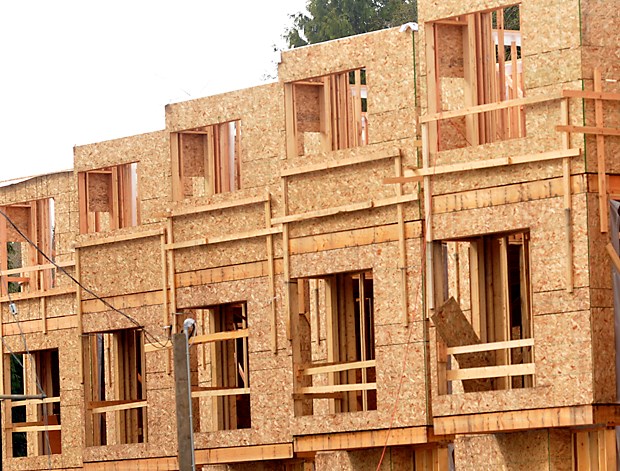Less than a year after housing dominated Burnaby’s municipal election, the issue remains top-of-mind for many voters ahead of the Oct. 21 federal election.
The major parties are promising distinct strategies to improve housing affordability in Burnaby and beyond.
Mayor Mike Hurley, who was elected on a housing-focused platform last October, said he has been “very frustrated” with the Trudeau government. The feds have promised billions to build social housing, but the mayor says that money has been completely inaccessible.
A string of meetings with the Liberal MP for Burnaby North-Seymour, Terry Beech, and one with the Prime Minister Justin Trudeau in June have all been fruitless, Hurley said.
“Terry always seems upbeat about it, but the reality is unless you have a shovel-ready project [you can’t get federal funding],” the mayor said.
The feds have locked the promised funds behind a litany of onerous criteria city staff have found “too tough to crack,” Hurley said.
The Liberals have promised billions in housing funding but according to Burnaby Mayor Hurley, that money is nowhere to be found.
— Kelvin Gawley (@byGawley) September 24, 2019
I asked the PM where the money is. #cdnpoli #elxn43 pic.twitter.com/mujAWkVFuC
Asked about Hurley’s concerns at a recent Burnaby campaign stop, Trudeau said he “was very happy to sit down with Mayor Mike Hurley just a few months ago to talk about housing.”
Trudeau said his national housing strategy promises $40 billion in investments across the country.
He also pointed to his recent campaign promise to make more homes eligible for the first-time homebuyers incentive by raising the maximum value to $789,000. The shared equity program will help “young families here in Burnaby and across the country,” he said.
There are currently no detached homes on the market in Burnaby with an asking price below $789,000, according to an Oct. 1 multiple listing service search that did, however, turn up several condos and townhomes below the threshold. According to a recent City of Burnaby report, the average sales prices are $1,530,700 for detached homes, $783,600 for townhouses and $698,200 for condos.
Meanwhile, Conservatives “are ready to address the concerns that Mayor Hurley has stated,” according to the party’s candidate in Burnaby South, Jay Shin.
Shin, a corporate lawyer, said his party would “knock down regulatory barriers” to encourage the construction of new homes.
“We need to increase the supply of new homes to have more homes on the market at lower prices. It's just a supply-and-demand issue,” he said.
The Conservative also said he believes the federal government has a place in funding housing projects, which can be done without raising taxes by reducing spending elsewhere.
NDP Leader and Burnaby South incumbent Jagmeet Singh is running on a promise to build 500,000 affordable housing units over 10 years. (He defines “affordable” as 30 per cent or less of a region’s median income.)
A New Democratic government would achieve that goal by funding co-ops, nonprofits, provinces and cities building affordable homes, he said. Singh also said he would provide federal land for affordable housing projects.
The NDP also promises to eliminate general sales tax for the construction of affordable units by private developers.
The Green Party’s housing policy is based on a belief that housing is a human right, said the party’s New Westminster-Burnaby candidate, Suzanne de Montigny.
“I'm not talking about a big expensive home, but a place where a person can live, because if you don't have a starting point, that little nest that belongs to you ... then you've got nothing,” de Montigny said.
She said the Greens are committed to building 25,000 units of affordable housing per year – half the NDP’s goal.
De Montigny said her party would partner with provinces to get those homes built and would also rehabilitate 15,000 existing units every year. She said the Greens would also increase both the national housing co-investment fund and the Canada housing benefit.
Andrey Pavlov, a finance professor at Simon Fraser Univerity’s Beedie School of Business, said he’s largely unimpressed with what the parties have to offer.
The Conservatives’ plan to sell federal land to developers is the only proposal sure to increase supply and, in turn, bring prices down, he said. Even if developers choose to build expensive market housing, it will be a move in the right direction, he said.
“The important point is I will take any supply. I will even take the wrong supply because any supply, given our supply shortage would help alleviate our affordability issues,” he said.
He said the NDP’s plan to eliminate GST for the construction of affordable housing “would help” but wouldn’t address the biggest barriers developers face – municipal zoning and permitting.
The various plans from the Liberals, NDP and Conservatives to fund new affordable housing represent the wrong approach, according to Pavlov.
“I'm very happy to pay people who are in need for objective reasons and give them money, but actually providing housing to someone is not that great for them and it's really bad for society,” he said, noting the assistance one receives when provided a home disappears if they move.
Housing is not generally a federal jurisdiction and instead falls to cities and provinces.
“The problem is that housing shortages are so severe in Burnaby and Vancouver and the Lower Mainland and Toronto, that this inevitably becomes a campaign issue at any level,” Pavlov said.



